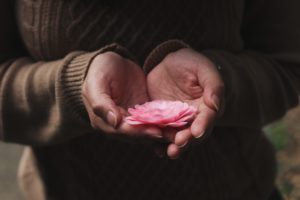by Jenny Rose | Feb 22, 2018 | Choice, Power
A small clay sculpture of a woman with her hands cupped in front of her chest sits on my desk. She holds a tiny clay bird and is surrounded by a couple of crystals, a piece of amethyst and a small geode. This little altar has been my daily companion for years. Wise and smiling, round and nurturing, the sculpture has comforted me through many losses, grief and rage. She’s one of my greatest treasures.

Letting Go
These days, the bird she holds is perched on the rim of the wooden dish she sits on, looking out at the room, at the world, at me. It can stay, or it can fly away. For now, it’s content to sit, watching and listening, as I live my life in these two small rooms at the top of our sagging farmhouse.
I have placed tiny polished garnets in the woman’s cupped hands where the bird once nestled.
I had a friend, dear and wise, in my old place who once said to me if we open our hands and let something go, and keep our hands open, something new will come and fill them. As she spoke, I again saw the image of an open hand, generous, allowing freedom, and prepared to welcome and support the next thing, and the next.
Letting go is power. Letting go is serenity. Letting go is an authentic act of love toward self and others. The usefulness of letting go is not a secret. Almost any self-help book out there talks about it as an aspect of healthy functioning, but I think popular psychology doesn’t explore it deeply enough.
Letting go doesn’t mean we brush aside our feelings. Not at all. Unexpressed feelings cement us in place. We all know people who remain frozen in time because of a death or traumatic event. Years and decades pass, but they don’t heal. They don’t move on. Their emotional growth is arrested. This is what unfinished emotional business looks like. Unexpressed feelings can’t flow through us and dissipate so we can release them.
We know very little about appropriately expressing our feelings in this culture.
Feelings aren’t thoughts. They’re not stories, expectations, beliefs or ideology. They’re not labels or rules. Like it or not, admit it or not, we’re physiologically wired for feelings, and they give us good information about how things are with us. Our thoughts and beliefs, on the other hand, are frequently distorted, confused, misinformed, outdated or otherwise unreliable.
That’s where letting go comes in.
We’ve all had events in our life that left deep scars. We’ve all seen things we can’t unsee, heard things we can’t unhear and done things we can’t undo. We’ve all felt disempowered or victimized at one time or another. Death and disaster enter our lives with no warning and take those we love.
Some people move on from such events with more grace than others. I suspect part of that grace has to do with forgiveness. Not forgetfulness, but forgiveness of self and others. I suspect another part is the ability to fully experience and express the feelings attached to the event. That requires a certain kind of support, and many folks don’t have it. Some people simply don’t choose to move on or let go. They center their thoughts, feelings and energy in the event, whatever it was, and they hold it tight, cherishing it, feeding the fire of their pain, keeping their scars open with the razor blade of their attention and focus. It becomes part of their identity, part of their story, a grievance to cling to, a betrayal to treasure, a wound to worship.

Photo by Andrey Grinkevich on Unsplash
I have a book called Clean Sweep, by Denny Sargent. It’s filled with rituals and instructions to help us let go of what no longer serves us. The author outlines a banishing exercise in which he suggests the reader visualize holding tightly to a thorny branch. In my own version, the branch is heavy, so heavy I can hardly hold it, which drives the thorns deeply into my flesh. The branch is a person, event, memory or belief that gives us emotional pain. We can make an easy choice and cling to it, cradle it, embrace it, let it tear our skin and make us bleed. We can make a harder choice and set it down, open our hands and let it fall. We can walk away from it. We can burn it or bury it.
In order to let go, we have to be willing to surrender control and endure loss. Letting go of a core piece of identity, a long-held belief or a painful memory is difficult work, even when that core piece, belief or memory gives us great pain. Letting go will leave a hole. Then what? Then who are we? How do we fill that hole? How do we understand ourselves and our place in the world? This is scary stuff.

Photo by a-shuhani on Unsplash
Aristotle said nature abhors a vacuum. My friend was right. If we open our hand and release what we’re holding, something else will come, though we can’t predict or control what it might be. In fact, the thing released might return to us in another form. We can’t know. We’ll never know unless we release our need to control. We’ll never find out what might perch on our open hand if we’re not willing to walk through loss in order to reach gain.
I’m having a long and involved break up with my desire to control. Some days I go all day without thinking about it, and other days I want to micromanage everyone and everything in my life. Some days I feel light and free, a confident and lovely woman, and other days I feel like a grubby three-year-old hiding under the covers sucking my thumb because nothing and no one is the way I want them to be. I sulk and pout and snarl and I feel crushed by the thorny weight of my need to control.
Then, at some point, my eye falls on my little clay wise woman and her cupped hands and wide-open heart, and I say, “Oh, yeah. That’s right. Letting go.”
I feel annoyed when people tell me to “get over it.” First of all, I have a right to my feelings, and secondly, it’s not that easy. Letting go, for me, is a practice, and I need time to engage in it. Sometimes I go back and find my leaden armful of hawthorn or bramble or locust and hold it again for a while, opening up all the old wounds, exhausting myself, hurting myself, and, finally, opening my hands and letting it fall again. Sometimes I need to design a ritual for letting go, a prayer or a dance or some kind of purification rite. Sometimes I need to make a physical resting place, like a grave or a patch of garden or a newly-planted tree in order to let something go. For me, taking time to honor whatever it is I’m trying to release is helpful. Whatever it is that no longer serves, it was once a part of my life and experience. Laying things to rest in this way helps me release them fully and finally.
When it comes right down to it, this blog has been an exercise in letting go as much as anything else.

Photo by Ester Marie Doysabas on Unsplash
When we know how to let go, we increase our power, as well as the power of others. Often, what we desperately hold onto is people. This is a strong archetype in old stories; locking the beautiful maiden in the stone tower to “protect” her. Part of love, as any seasoned parent will tell you, is letting go. Imprisoning, disempowering and trying to control others isn’t love. Refusing to let go of someone isn’t love.
Releasing our grievances with others frees them as well as ourselves. Being willing to accept an apology, an explanation, and the imperfections of others allows us all to move forward with lighter loads. The stories and memories we hurt ourselves with are often ghosts, events involving people who are long dead and far in the past. We can choose to bless them and lay them to rest.
I don’t want to haul around painful memories, toxic garbage, the futility of trying to control life and ineffective behaviors and beliefs. I can’t swim with all that tied to my ankle. I can’t dance. I can’t embrace anything or anyone with an armful of brambles. I can’t create with a heart full of thorns.
I want to be free.
I open my hands.

Photo by Stephen Leonardi on Unsplash
Make a Boat
Make a boat
out of who you are
not what you have.
If you don’t know who you are
(Search for the desert between the worlds.
Find Bone Mother.
Recollect.
Reassemble.
Bathe in soul.
Birth yourself.)
That is another journey.
Your boat will be small.
You can take no one.
You can take no thing.
Shape your boat with your truth.
Shape it with the joy in your hands
and the wisdom in the soles of your feet.
Make a chisel of rage and grief.
Sand with the grit of clarity.
Stain with blood.
Oil your boat with the moisture and musk of your sex.
Stitch the rags of your life into a sail.
Weave rope from your hair.
Take your time
And remember
Fear does not float.
When you know the boat is ready,
Sit in it.
Lay the backs of your hands on your knees.
Open your hands.
Let everything go.
Let everything go.
Keep your hands open
So that new things may come.
Without fear
Ask the one who stands just behind your shoulder
The one who shelters your life in the shadow of her wing
To come forward.
She will guide the boat.
Surrender yourself to your boat,
to the water,
to your guide.
Find your breath.
Stay there.
Find your heartbeat.
Stay there.
Keep your hands open.
Rest.
Don’t stand up in the boat!
Don’t throw yourself out of the boat!
Don’t you want to see where you are going?
Look. See how the feathers on her wing
trail in the water?
All content on this site ©2018
Jennifer Rose
except where otherwise noted
by Jenny Rose | Apr 16, 2022 | A Flourishing Woman, The Journey
In the online Red Cross Lifeguard Course, there’s a segment titled “When Things Don’t Go As Planned.” Every time I come across it, I smile.

Photo by NeONBRAND on Unsplash
Yes, indeedy. Because things often don’t go as planned.
Learning, in a real or virtual classroom, from text or videos or slideshows or YouTube, is necessarily simplified. The situations are controlled. Even the blood looks like cherry-flavored candy.
As a blogger, I ruminate, explore, define, proceed logically, and research. I’ve touched on so many different topics over the years here on Harvesting Stones. I’ve examined needs and boundaries, reciprocity and connection, contribution and authenticity.
However, this kind of intellectual exercise, learning at a remove, is not where the real mastery is.
The mastery comes when we put it all into action in real life. And real life is unbelievably messy. Real life is a loose cannon on a rolling deck. Real life does not go as planned.
We are occasionally plunged into chaos, into complicated experiences involving a lot of feelings and requiring all our skills. Our predictable routines and schedules turn inside out. We are not able to care for ourselves or anybody else as usual. We become exhausted. Our personal demons crawl out of our subconscious attics and cellars and play with us. Our physical weaknesses take advantage of our stress. We lose track of our power. We lose track of ourselves.

Photo by Quino Al on Unsplash
I would avoid such times if I could. I believe most of us would. Few people enjoy living in a maelstrom. The thing is, the maelstrom holds gifts, insights and growth we would never realize if we always lived serene, well-controlled lives.
I’m writing this on Wednesday morning. A week ago today, less than 24 hours before closing on the house we’re selling and the house we’re buying, closing was cancelled. Well, “extended.” I’m not sure there’s a difference, but my hope is pretty frayed right now, so I’m inclined to be pessimistic.
I thought I had been living in chaos before that abrupt last-minute change of plans, but those far-off days seem like a cake walk compared to what the last seven days have been like for me.
When our lives fall apart in painful ways, part of the stress of it is the rest of the world goes right on without giving us space and time to process, remember our resilience, and get back on our feet. I still needed to figure out how to get the car in to get the studded snows changed. I still have bills to pay. I still have a job. I still need to search the stores for cat food. I still have family birthdays to remember. The bed still needs to be made, the dishes washed, the laundry done. I want to remain consistent in my writing.
Autoimmune disease is highly opportunistic. I have not had this amount of stress since I moved to Maine seven years ago, and within a few hours of the cancelled closings my back went into spasm, which means I need all the love, rest, and care I can give myself right now, in the middle of the shit show. My body would feel better if we could close and get this move over with. And I can’t possibly move with this level of pain.
Meanwhile, the world turns. I feel guilty about my struggle when I know people in Ukraine are losing their homes, lives, loved ones, and perhaps their country. I tell myself I’m being dramatic, I’m whining, I never deserved for things to work out in the first place, etc., etc.
I told you about the personal demons crawling out, right?
So what do we do during times like these? How do we get through them? How do I turn the concepts of letting go, courage, detachment from outcomes, and emotional intelligence into tools to help myself? It’s all so clear, logical, and neat on the page/screen. I believe every word I write. It’s all organized and categorized.
When things don’t go as planned, nothing is neat, organized, or categorized. We can’t think well. Our feelings sweep us from fear to fury to despair and back again.
In my old dance group, we used to say when you feel overwhelmed, dance small.
Dance. Small.
Dancing small is focusing on breathing in and out. It’s making small movements. It’s wrapping your arms around yourself, facing a wall or a corner, closing your eyes, and concentrating on the floor under your feet. It’s deliberately sinking into yourself and letting everything and everyone else go as best you can. It might be the healing release of tears.

Photo by Leon Liu on Unsplash
This strategy doesn’t make the chaos go away, but it does give us a small resting place within the chaos. It allows us to find and hold onto ourselves. It gives us a tiny bit of power. It allows a little space for rational thought, for us to remind ourselves of what’s true:
- Nothing stays the same; all things pass
- Things invariably work out somehow, some way
- There is always much to be grateful for
- We are allowed to have feelings about our experience, and they’re allowed to be messy
- We always have some choice
- None of it is personal
This week, though in many ways painful and difficult, has also provided me with valuable practical experience in using some of my newer skills. It’s given me a chance to stay in my own power, always a worthy practice. I’ve had an epiphany about a longstanding destructive pattern in my relationships which has emotionally freed me in significant ways. Paradoxically, the current chaos has brought me clarity.
I’ve also been touched and humbled by the support I’ve received from friends and other members of my community. I am not alone.
Most of all, it’s given me a chance to deal with my feelings. It occurs to me the word “stress” is misleading. I don’t need to deal with my stress. My feelings need attention. They need to be named, welcomed, fully experienced, and released, no matter if they’re in my head, heart, or back. Managing my feelings will take care of my stress and my physical discomfort.
By the time you read this, things will have changed. Perhaps we’ll have a new closing date. Perhaps I’ll have decided to make a different plan. Perhaps we’ll still be in limbo, but it will be a different day in limbo. Today, we’ve taken my car in to get the tires changed, so that’s something taken care of. At some point, the muscles in my back will unclench and I’ll move freely again and be able to resume exercise.
Meanwhile, frogs boom, chuckle, and peep in the pond. The birds are busy and the spring dawn chorus gladdens each morning. The phoebe has returned and hunts from the barn roof. Rain falls and the sun shines. The mud is gradually drying up. I will feed the cats, play with them, clean their boxes. I’ll go to work, teach swim lessons, wipe down the locker rooms, read the pool chemicals, guard lives, answer the phone. I’ll feed myself, drink cups of tea, rest, write, read, and sleep. Time will pass. Days will pass.
It will all pass, the things that go as planned, and the things that don’t.

Photo by henry fournier on Unsplash
by Jenny Rose | Nov 20, 2021 | Connection & Community, Emotional Intelligence
I was cleaning cat hair off our furniture a couple of days ago and thinking about the Golden Rule. I muttered about it, too. To the cats, who had no opinion but thought the whole removing-cat-hair-with-a-dish-glove business highly entertaining and a good game. They wanted the cat hair back. I wanted to get rid of it.

Ozzy 2021
Sometimes I feel I’ve spent my life cleaning.
Don’t get me wrong. Cleaning can be a sacred activity, a Baba Yaga kind of activity. Few things are as satisfying to me as making order out of chaos; sorting the unwanted and unnecessary from the useful and beautiful is something I always enjoy.
On the other hand, cleaning is emotional labor. Physical labor, too.
When I say “I love you,” part of that is a commitment to provide a clean, comfortable, healthy space. Part of my own self-respect and self-love is providing myself a clean, comfortable, healthy space.
It’s not a question of money. Paint is peeling off many surfaces in this house. That doesn’t mean those surfaces need to be dirty. Yes, the floor is pitted, stained and scarred. That doesn’t mean I don’t bother to scrub off the grime. Yes, the front door gaps and sags. The metal screen door is getting rusty. That doesn’t mean they have to be filthy.
So, cleaning. For all of us, myself, my partner, and the cats.
I know some people will say the cats don’t care. My partner has said he doesn’t notice.
But I care. I notice. And I don’t know the cats don’t care. Why should they live in unnecessary squalor?
Anyway. The Golden Rule. Do unto others, etc.
I think the Golden Rule is a good way to live. I live by it. The problem is the rule itself implies others will do unto you as you do unto them.
And that’s simply not true.

Photo by Evan Kirby on Unsplash
It’s like tolerance, or respect, or reciprocity. Treating others by those standards does not mean we’ll receive the same treatment.
I’m angry about that. Living by the Golden Rule is expensive in time, energy, and patience. I choose to do it because it’s part of my integrity as a human being, but it’s not easy, and it’s not an investment that always pays off. Which is sad. And disconnecting.
I’ve asked it before and I ask it again. When have we given enough?
Then I received a post in my Inbox from Joshua Fields Millburn titled ‘The Boundaries of Discontent’ about this very subject. Tolerance, he says “can be a magnet for neglect.”
Amen.
The Golden Rule is an effective guide for choice. I feel good about myself and the way I show up in the world when I employ it. But it’s only the first step.
The second step is observing whether it’s reciprocated in any given situation and continuing to make healthy, self-supportive choices based on that observation.
It’s wonderful to give positive things to the world and others, but we need to notice if we’re not receiving in kind. Giving out of an emotional deficit is not sustainable. We deserve more than that. We can find people who live the Golden Rule, people like us.
Millburn says we encourage what we tolerate, and he’s right. Tolerance is too heavy to carry alone in a relationship, and unbalanced tolerance is simply clutter. When we stop tolerating the absence of reciprocity, or more than a few days of cat hair on the furniture, we can move into a simpler, clearer, cleaner life.
Healthy boundaries are not intolerance.
I don’t want to be the friend who never reciprocates. In fact, I’ve voluntarily left more than one relationship because it was clear that who I am was making others unhappy or uncomfortable and I was unable to find a way forward into something healthier with them. I don’t want toxic people in my life, and I won’t be a toxic person for anyone else, either. Do unto others has sometimes meant letting go and moving on for my sake and theirs.
Tools for healthy relationship and connection like the Golden Rule work best when both parties bear their weight and use them. If that’s not happening, the tool becomes ineffective, even destructive, and the relationship falters.
Do unto others as you would have them do unto you. To a point. But don’t get too carried away. And don’t build expectations of reciprocity around it. Follow it because you believe it’s the right thing to do and let go of the rest.

Photo by Roderico Y. Díaz on Unsplash
by Jenny Rose | Aug 31, 2024 | A Flourishing Woman, The Journey
In July of 2016 I wrote my first post on this blog, a letter of resignation from people pleasing. Since then, that post has had more than 20,000 views. A comparatively modest number for the internet, but for me personally an astounding one.
Now, in August of 2024, I’m writing another letter, this one a heartfelt thank you to all of you who read my words, commented, and sent my work on to others over the years. I hope my posts will continue to find those who are treading some of the same paths I have.
When I began this blog, the only goal I could identify was to have the courage to do it. I wasn’t sure who I was or what I thought and I didn’t know how to use my true voice. I felt as though I was fighting for my life. I didn’t expect anyone would read it, but I knew I needed to write it. I wasn’t sure why, exactly, but I knew I had to, and I knew intuitively whatever I wrote here would be real and true and honest. I wanted to find that woman, know her, and reclaim her if I could.

Photo by Ryan Moreno on Unsplash
I did not imagine how powerful the practice of blogging would be for me. I did not dream of the healing, the growth and learning, and the self-acceptance I’ve achieved.
I almost never take vacations. I don’t say that with pride or a sense of superiority. In fact, I’m determined to give myself more regular breaks in the future. I’m off work when sick or injured, of course. We were furloughed during the pandemic, but that hardly felt like a vacation. However, for two weeks the pool facility where I work is closed down for maintenance, and I was amazed at how I looked forward to these two weeks, how I longed for them.
I’m not traveling, or doing anything wildly different or special, but the gift of time is exquisite. Time without clocks or my phone. Time in the garden. Hours in which to read and write. Time to sit in the sun, take a catnap. Time like a ripple of playful music, empty, inviting, unpressured. Time to think and feel and drift. Time for inspiration and intuition.
When I feel like I don’t have enough time during normal working life, I’m harsh with myself. I tell myself we all find time to do the things that matter and if I’m not, either I don’t really want to do what I think I want to do or I’m doing life WRONG. Again. I’m lazy, I’m disorganized, I’m ineffective, I’m wasting time, and I’m making excuses. So I work harder, get up a little earlier. I try to be more organized. I simplify my routines. I keep moving, producing, and doing.
In these days of my vacation, however, I discover when I have time, real, unlimited, unbounded time, I fall joyfully into exactly what I most want to do (working on my third book), like plunging into a lazy summer river.
I’ve been asking myself what needs to happen for me to follow my heart and soul into writing this book and all the books after it. Now, when the voice of my intuition says ‘more time,’ I’m listening instead of attacking myself. Maybe my story does need more of me than I’ve been giving it, more presence, more space, more energy, more time.
I’ve been thinking about the shape of my life, what I do in a day, a week, a month. I’ve wondered what I can take out. Not work. Not gardening. Not exercise. Not reading. Not Substack, where I serial post my fiction and occasional essays. It occurred to me to wonder if I’m ready to let go of Harvesting Stones.
This morning, while driving to get groceries in early morning rain, I found myself mentally drafting this post, and I thought, I guess I am ready. And I felt sad. Thunder rolled, as it had been all morning. The wipers went back and forth. I sat looking at a stoplight, waiting for the green arrow, and for a moment I let Harvesting Stones drift away, shining, heavy with words, a creased and folded roadmap of my psyche, so full of effort and vulnerability. I imagined space and time and energy in the place where it had been and I thought about letting die what must.
Sadness was there, yes, but also peace. A sense of rightness. I’ve found an interactive community on Substack where comments turn into discussions and inspiration. I like the creative energy there, the collaborative tools and people. Harvesting Stones has been a solo endeavor, hugely growthful when I began because it forced me out of hiding, but now the challenge is gone and I’m ready for more interaction, more connection, and the endless fascination of writing compelling fiction.
It’s been some time since I’ve seen the path ahead so clearly in my writing life, and I want to find out where it leads.
I’m going to leave Harvesting Stones up, just as it is, in the hopes people will continue to stumble across it and find it useful. I will still receive and answer comments and maintain the site. You can always find me on Substack. My work there is free to read, just as it’s been here.
This blog has been one of the most significant things I’ve ever done. Letting go is hard. I cannot close this chapter in my life without thanking my emotional intelligence coach. Without him, I would not be in Maine. I would not have started blogging. I would not have written two books and be working on a third. I’m not sure I’d even be alive. I certainly would not have reclaimed my health and joy. I did the work, but he showed me the way.
Thank you all for being part of my journey. Come see me on Substack!

By Danijel Durkovic on Unsplash
by Jenny Rose | May 27, 2023 | Connection & Community
My partner tells me I “build bridges.” He’s right. I do. All the time. Building connection is the foundation of my life – connection with myself and with others. I also do what I can to support connection between others.
It’s no wonder I feel increasingly alienated in a culture focused so strongly on division.

Image by Bob Dmyt from Pixabay
Some people, and right now many people in power, are breakers rather than builders. I won’t pretend I understand such a priority, but it’s undeniably real and undeniably destructive.
As I’ve thought about building bridges, I’ve realized underneath the patterns of building or breaking is a larger issue: power.
If evil exists, I believe one of the first steps on the road to it is the willingness to steal power by any and all means. When individuals and groups of people lose their power, they’re easy to break, easy to disconnect and isolate. Easy to control.
Dedicated power-stealers are very, very skilled at what they do, so skilled they often present themselves as the marginalized or disempowered victims. In this guise, they infiltrate systems, organizations, and groups like a cancer, steadily breaking healthy connections and communities and appropriating power. By the time enough people notice, clearly identify what’s happening, and organize resistance, the balance of power is so skewed serious conflict becomes inevitable. Those addicted to stealing and hoarding power don’t give it up without a fight. This classic aggressor behavior is referred to as DARVO: Deny, Attack, Reverse Victim and Offender. In this dynamic, when individuals and groups are forced to defend themselves from aggressors their defense is framed as bigotry and hatred. Brutal social sanctions steered by those who steal power are activated to stifle it.
Few see past the emotional rubble and wreckage of destruction to the offense triggering the defense, and even fewer see past all the drama and distraction and recognize a simple, savage power grab disguised as social justice, political correctness, compassion, empathy, etc.
This is not to negate the true problems of systemic and institutionalized racism and bigotry so many people stagger under every day. We all know power (and other resources) are not distributed equally – far from it. And why is that? Because there have always been people who are committed to disempowering others.

Photo by Tim Gouw on Unsplash
I’m a builder, not a breaker. Not a breaker, I hasten to say, in the sense that I deliberately hurt others or injure healthy connection. However, I have more than once tried to build a bridge to nowhere. Worse, I have spent much of my life frantically maintaining my bridges to nowhere, a kind of counter-terrorist who never blows up a bridge but instead batters myself against a broken one as though my blood, sweat, and tears will magically build a solid, effective connection.
The thing I invariably forget is not everyone wants to build a bridge!
Sometimes, and I’ve done this, we blow up bridges accidentally. Some action or word becomes a catalyst and suddenly … BOOM! The bridge is destroyed and we’re left wondering what the hell happened.
Sometimes our bridges are sabotaged by others and deliberately destroyed. Unless both parties connected by the bridge understand what’s happened and work together to make repairs, the bridge becomes permanently weakened.
Sometimes, and I’ve made this choice, too, we deliberately walk away from a bridge we’ve built. It didn’t connect us to what we were hoping for, or it didn’t connect us at all. We built the bridge, it went nowhere, and we found no there there, so we leave it behind to fall into disrepair.
Saddest of all (to me) are the people who don’t value bridges, or can’t recognize them. Building is expensive. It takes time, patience, commitment, and cooperation. It takes emotional labor. For me, the rewards of good bridgework are enormous. Healthy connections enrich us and I believe bring joy and healing into a suffering world. Healthy connections enhance individual power and are productive and creative rather than destructive.
Anyone can destroy. How many can create?
At the same time, I accept and endeavor to respect that some people have no interest in building bridges, at least not with me. Some people are focused on other things, and the activity central to the meaning and purpose of my life isn’t in their field of view at all.

By Landsil on Unsplash
It’s probably unwise and unnecessary to take this personally, although I have a tendency to do so. On the other hand, I have no interest in coercing anyone to build a bridge between us. Forcing healthy connection is impossible, not to mention coercion is a power-over tactic I don’t employ or participate in.
Sometimes I build bridges to nowhere. I work hard, for a long time, because that’s my default. Eventually, however, I notice I’m the only one building. A little bit after that I wonder what would happen if I stopped building. Would the person I want connection with even notice? Would they pick up the work I left undone? Would they value our potential connection enough to meet me half way? Part way?
Honestly, in the case of most of my bridges to nowhere, once I stop building the building stops. I move on, looking for another place to build another bridge. Those abandoned bridges are, at best, picturesque ruins going … nowhere. Resting places for unrealized possibility and potential. Crumbling monuments to loss, heartbreak, letting go, and wisdom.
Questions:
- Consider your life. Are you more of a builder or a breaker?
- When you struggle to connect with someone who’s just not that into you, how do you feel?
- If you can’t successfully build a connection with someone, do you leave quietly or blow up the metaphorical bridge you were trying to build?
- Who or what has sabotaged previously healthy connections in your life?
Leave a comment below!
To read my fiction, serially published free every week, go here:

















